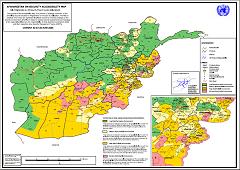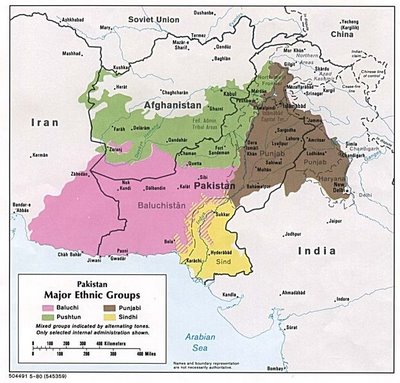Stop thinking in terms of lines on a map
Babble on.
Many people who know Central Asia quite well have been pointing to Pakistan as an ongoing source of problems for Afghanistan. Afghan President Hamid Karzai and his government certainly believe the Pakistanis need to do more. So does no less an impartial expert on the area than Chris Alexander, former Canadian Ambassador and now a top level U.N. representative. His words exemplify this school of thought:
There are three times the casualties this year than in 2005, he says.
"So we have to do things differently, and we have to think of all the factors driving the intensity of attacks this year, and that takes us instantly into a regional discussion, not just an Afghan discussion."
By regional, of course, Mr. Alexander means Pakistan, which is now home to the Taliban leadership and is coming under increasing pressure to crack down on the fighters who cross into Afghanistan every week.
"And everyone who's fighting this out, and other members of NATO, are having franker and franker discussions I think across the board, and that includes the UN. We've been to see [Pakistan's President Pervez] Musharraf, and he's agreed with us that Talibanization is a threat to his country as well as to Afghanistan, and he is, in a sense, fighting the Taliban.
"The trick will be to have them crack down on the Taliban who are fighting in Afghanistan, mostly from Quetta. . . . My sense is, Pakistanis, when accused of offering refuge to a good part of the leadership, when they're accused of training camps and so forth, put up a huge hue and cry, deny everything, ask for the evidence, accuse the Afghans of not having their own house in order.
"Well," he said flatly, "the evidence is overwhelming, and in fact, we're not even discussing the evidence any more. We're really discussing what to do and how to do it."
In Mr. Alexander's forthright language is proof of a change probably at least as stark as the deterioration in security here -- the open acknowledgment of Pakistan's role, which even a few months ago was being much more delicately discussed.
In his view, that is "the No. 1 risk" to Afghanistan's tentative recovery -- "that the factors contributing to this insurgency won't be addressed, and that they might get worse.
"And let's be very honest: They are not all, or even principally, within Afghanistan's control or on the territory of this country.
"The Taliban was defeated in 2001, but was not dismantled as a leadership structure. It was pushed out [to Pakistan] . . . . They moved. They picked themselves up. They were a ragtag lot, in disarray, and in the early days of 2001-2002 they were even in hiding.
"But because no one arrested them, they were not challenged in that new environment, and they put themselves back together and are much stronger three years later than they were in 2002, and therefore the punch they pack across the border in engineering this insurgency, in training bombers, launching suicide bombers into the Afghan environment for the first time in recorded history, is much larger than it was in 2003. So that's the No. 1 challenge."
I have nothing but respect for Messrs. Alexander and Karzai, but I do have a question for them: if the current security problem in Afghanistan is largely driven by Pakistani government foot-dragging, then why does a security map of Afghanistan look like this? (ht:Bill Roggio)

Given the fact that the Pakistani government is at least nominally an ally in the War on Terror and that the Iranian government is undoubtedly more hostile to Western interests in the region, if the insurgency is truly due to foreign support, shouldn't the Iranian border be coloured red instead of green?
Don't tell me the Iranians wouldn't stir things up if they could. Don't tell me they're not hoping NATO, the UN, and especially the hated Americans get their collective noses bloodied fighting a guerilla war in Afghanistan. My guess is that they're trying their damndest to capitalize on whatever Afghan discontent they can find, but the locals on the Iranian border aren't biting.
So here's my hypothesis: the tenuous security situation in southern Afghanistan isn't the result of Pakistani governmental foot-dragging, it's a direct consequence of having a population in that area that acknowledges tribal authority over national and is highly resistant to reform.
Oh, Musharraf's gang can certainly do more to crack down and assert Islamabad's authority in the border area, and they should. But I believe blaming so much of the insurgency's strength on the Pakistani government is symptomatic of a flawed perspective: to a Pashtun in Kandahar, the Pashtun in Quetta isn't foreign.

The problem isn't the Pakistani government, it's a strong element within the Pashtuns, regardless of which side of the border they live on. Because governments are constrained by borders, however, we're fighting an insurgency from the wrong ideological orientation. It remains to be seen how much that disadvantage will affect the outcome of this great endeavour.
Babble off.







1 Comments:
Babble: Some good points about Pathans. The problem however is also to a considerable extent a result of the fact that the Taliban ("talib" meaning student) were largely the products of Madrassas for Pathan refugees in Pakistan during and after the anti-Soviet war. Strong links remain.
Moreover, Pakistani intelligence (ISID) was instrumental in supporting them in their campaign for power (1994-96) and as a government thereafter, in order to secure Pakistani influence in Afstan ahead of India's and Iran's.
ISID is heavily Islamist and the government's control over it is very delicate. It is very likely that while the Army (Musharraf's base) is fighting the Taliban and al Qaeda in the tribal areas, ISID is helping them at the same time.
Confusing but real. And Musharraf has to give Pakistani Islamists a lot of leaway to hold on to power. The US and others are forced to accept this ambivalent situation as their worst fear is an Islamic government in Pakistan--with the bomb.
The Iranians will never have much influence on the Afghan peoples generally, since the Afghans are all Sunni, save for the Hazara, one of the smaller ethnic groups. And the rest of the Afghans--Pathans, Tajiks, Uzbeks, etc.--look down on the Hazara as the lowest of the low (the Hazara aren't helped by the fact that they are ethnically Mongol and physically quite distinct from other Afghans).
Mark
Ottawa
Post a Comment
<< Home